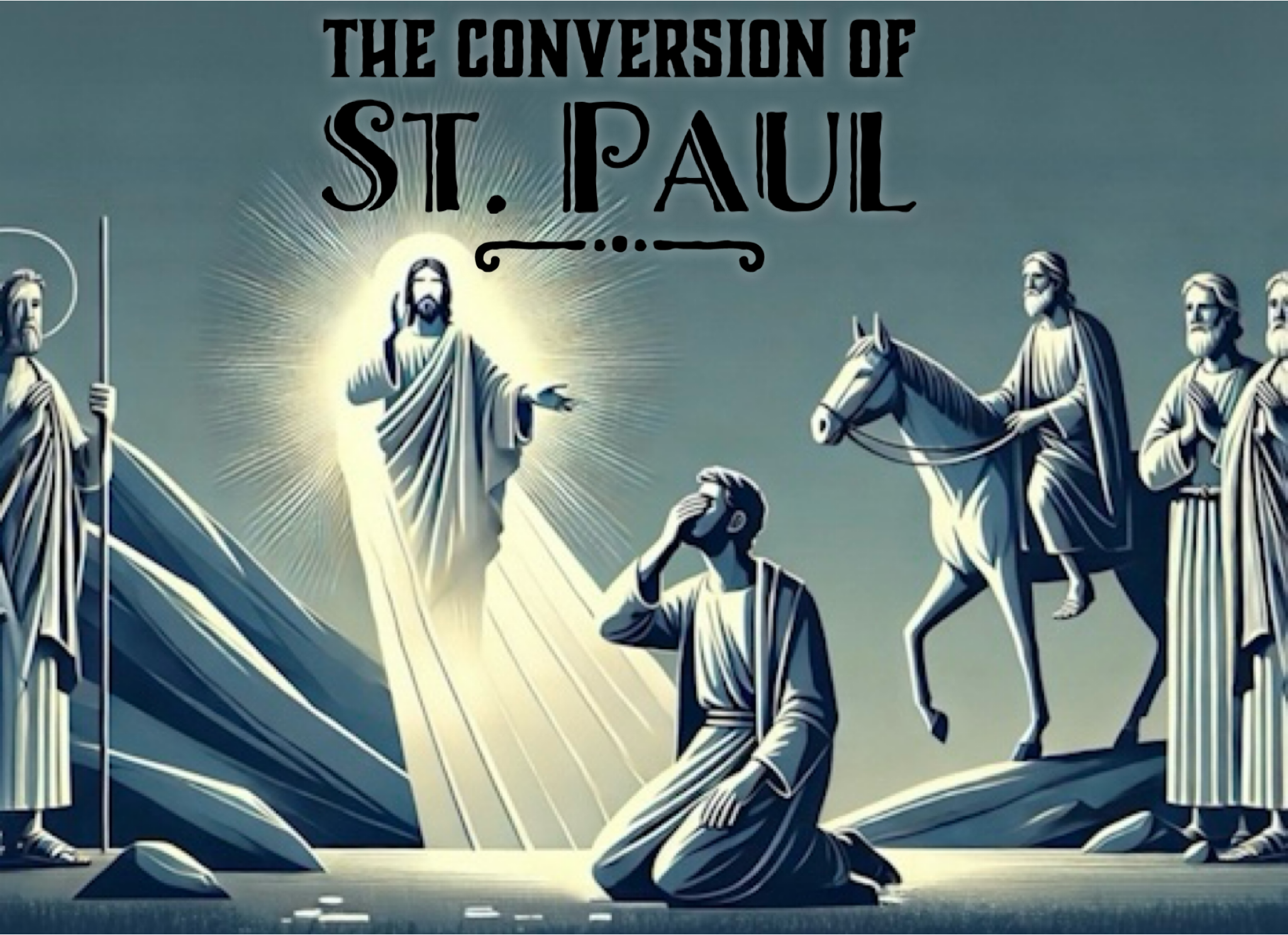The Feast of the Conversion of St. Paul: A Complicated Saint and the Mysteries of Tradition

The Radical Grace and Enduring Mystery of St. Paul
On January 25th, the Church celebrates one of the most dramatic conversions in history: Saul of Tarsus, the fearsome persecutor of early Christians, blinded by divine light on the road to Damascus and transformed into Paul, the tireless apostle to the Gentiles. We cannot fully grasp what that moment was like for Paul, but this much is certain—his encounter with Christ utterly and irrevocably transformed him. His story is one of radical grace, a testament to the boundless reach of divine mercy. If ever there were proof that no one is beyond redemption, that God delights in upending human expectations by calling the most improbable of people into service, it is found on the road to Damascus.

Paul’s influence on Christianity is immense. His letters form nearly a third of the New Testament. His theology—especially on grace, faith, and the nature of the Church—shaped the early Christian world and continues to echo through liturgy, doctrine, and devotion.
However, Paul remains a figure of significant controversy, particularly in his pronouncements on women and social order, which many find unsettling—some for their apparent rigidity, others for the ways they have been weaponized. His writings have been variously misread, selectively emphasized, or outright distorted to prop up hierarchical structures that, with the benefit of both scholarship and moral progress, we now recognize as neither divinely mandated nor ethically defensible. Worse still, his words have been conscripted into the service of exclusion, wielded as theological bludgeons to justify marginalization and inflict spiritual harm. One might reasonably wonder whether Paul himself would recognize, let alone endorse, the more egregious uses to which his letters were subjected.
Shall You Cast the First Stone?

But before we cast judgment, we must place Paul in his time. He wrote in the context of a rigid Roman social structure, where the idea of equality as we understand it was nearly unthinkable. If history teaches us anything, it is that moral standards shift. A thousand years from now, people may look at our era with bewilderment, critiquing what we fail to see. Yet Paul, despite his cultural limitations, planted seeds of radical inclusion: “There is neither Jew nor Greek, slave nor free, male nor female, for you are all one in Christ Jesus” (Galatians 3:28). The Church’s best moments have come when it has lived into that vision.
Paul and the Early Church: A Mysterious Legacy
Paul’s letters—originally written to struggling Christian communities—became some of, if not the, first Christian scriptures, read aloud in secret gatherings before the Gospels were widely circulated. By the second century, his writings were copied, studied, and debated, especially as early Christians tried to reconcile his teachings with the growing institutional Church—the church is still struggling with this phenomenon.

One of the strangest traditions linked to Paul is the Chains of St. Paul—a relic venerated in Rome, believed to be the very chains that bound him in prison. Since at least the fifth century, these chains have been housed in the Basilica of San Paolo fuori le Mura. Pilgrims have reported miraculous healings simply by touching them. Whether one believes in their authenticity or not, the devotion to them speaks to the deep imprint Paul left on Christian imagination.
Then there’s the matter of Paul’s missing letter. In Colossians 4:16, he instructs the church to read “the letter from Laodicea.” No such letter exists in the New Testament, and its contents remain unknown. Some believe it was lost to history, while others suggest it was suppressed due to controversial content. What might it have contained? A theological insight lost to time? A mundane greeting? We may never know.

Another mystery involves the peculiar way Paul’s life ended. Tradition holds that he was martyred in Rome under Emperor Nero, around the same time as Peter. However, unlike Peter—who, according to legend, was crucified upside-down—Paul, being a Roman citizen, was granted a more “honorable” execution: beheading. One medieval tradition even claims that after his head was struck off, it bounced three times, and at each spot where it landed, a spring of water gushed forth. The site, now marked by the Abbey of Tre Fontane (Three Fountains), remains a place of pilgrimage.
Paul’s Presence in Worship
Despite his complexities, Paul is unavoidable in the Church’s life. The Episcopal Church, following the Revised Common Lectionary, ensures that his letters are read constantly. His words infuse our worship: the soaring poetry of 1 Corinthians 13 on love, the challenge of Philippians 2 to imitate Christ’s humility, the deep comfort of Romans 8—“nothing can separate us from the love of God.” His influence is so pervasive that, even if one finds him difficult, ignoring him is impossible.
Three Takeaways from Paul
- God’s grace transforms even the most unlikely people.
Paul’s own life is proof that no one is beyond redemption. He went from hunting down Christians to becoming the Church’s greatest missionary. If God could work through someone with Paul’s past, there is hope for all of us. But notice—Paul wasn’t transformed instantly. Even after his dramatic conversion, he spent years in relative obscurity before stepping fully into his mission (Galatians 1:17-18). Grace is not a one-time event but a lifelong process. This means we must be patient with ourselves and with one another. The Church is not a gathering of perfect people; it is a place where we are being shaped by mercy. If God did not cast Paul aside for his failures, we should be slow to cast each other aside. - Faith and reason go hand in hand.
Paul was both a mystic and a scholar. He had ecstatic spiritual experiences (2 Corinthians 12:2-4), but he also argued persuasively about theology (Romans, Galatians). His example calls us to use both heart and mind in faith. But it also means we should resist rushing to judgment. Paul often urges churches to work through disagreements with patience: “Bear with one another in love” (Ephesians 4:2). He rebukes factions and infighting (1 Corinthians 1:10-13) and discourages those who stir up unnecessary disputes (Titus 3:9-11). In other words, the Church is healthiest when we engage in dialogue rather than the Festivus tradition of airing grievances. Paul calls us to something harder—reconciliation. - The Gospel is for all people, and unity matters.
Paul’s mission was radical: he insisted that the message of Christ was not just for the Jewish people but for Gentiles as well. This caused enormous controversy, yet Paul refused to waver—Christ’s love transcends all boundaries (Galatians 3:28). But notice how he carried out this mission: not by tearing others down, but by bringing them together. He encouraged unity, telling believers not to “bite and devour one another” (Galatians 5:15). He also warns against tattling and stirring up conflict: “Why not rather be wronged? Why not rather be defrauded?” (1 Corinthians 6:7). His point? The mission of the Gospel is more important than our personal grievances. We do not have to agree on everything, but we should not work against each other.
Paul remains an enigma—a man of his time and yet, in many ways, so far ahead of it. He was bold, flawed, brilliant, and, above all, utterly convinced that Jesus had changed everything. On his feast day, we remember that God calls imperfect people to share perfect love.
Related Posts
Why I Started Wearing A Zucchetto: The Meaning Behind the “Beanie.”
Let’s go ahead and get this out of the way… it’…
August 22, 2023Spiritual Resources for Self-Care During Coronavirus: Four Ways to Remain Spiritually Resilient
Why Spiritual Self-Care? I bet you’re a lot like me; you’…
April 10, 2020
